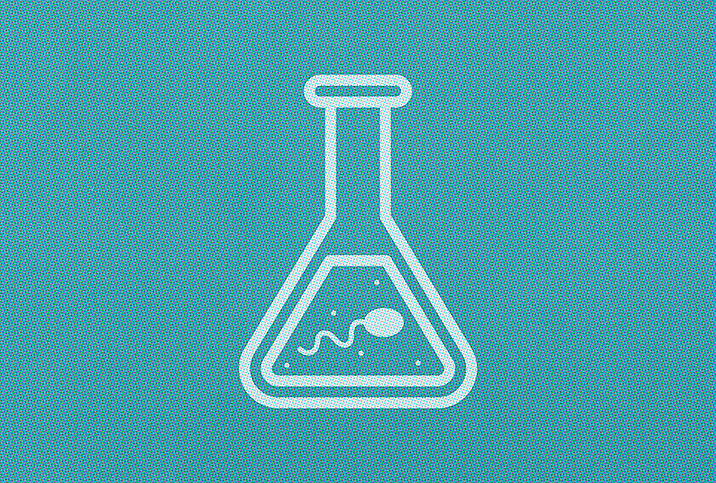Beating Yourself Up Over Fertility Struggles Won't Solve Anything

Unless and until you struggle with it yourself, chances are you haven't spent a whole lot of time thinking about male infertility. Let's face it: It's not exactly the future you dreamed of as a kid. Fertility is often assumed to be the default human state, but about 7 percent of men have fertility problems. Complicating the situation even more is that in our society, fertility goes hand in hand with masculinity. A "real" man, we're told, is one who is strong, virile and has healthy sperm.
It's no surprise then that men who struggle to conceive with their partners often go through an identity crisis. Even if you know there's no real logic to that thought, you might find yourself asking questions such as "What's wrong with me? or" "Is it because I don't really want a child?" or "Am I not trying hard enough?"
These emotions are something that Paul Turek, M.D., an expert in male reproductive health and founder/owner of the Turek Clinic in Los Angeles and San Francisco, sees all the time.
"Infertility hits a man very deeply because they've never thought about it before—they've always assumed that there would never be an issue," Turek said. "There's a lot of guilt around this that strikes at the heart of masculinity."
But remember: That guilt is usually unfounded.
Getting to the heart of the issue
"The vast majority of [infertility problems] have nothing to do with what you want or how much you want it," Turek explained.
You may be struggling to conceive for any number of reasons, but berating yourself is the last thing you should do. A negative attitude can make the process even harder.
"Anxiety can hurt your ability to conceive," Turek said. "That's not what you want for an erection or sex drive."
Performance issues aside, dwelling on your perceived inadequacy can also prevent you from taking the necessary proactive steps to identify the issue (or issues) at hand.
The field of male fertility has advanced by leaps and bounds in the past 25 years, according to Turek. "When you saw a guy struggling with infertility, 80 percent of the time you would just shrug your shoulders and say, 'I'm not sure what's going on,'" he said. "Now, that probably only happens 10 percent of the time. Our root-cause analysis is getting so much better."
And once you know what's going on, you can take steps to fix it.
"There's a big misconception that you can't do much for men" who struggle with infertility, Turek said. But that couldn't be further from the truth.
Finding solutions
Sometimes, all it takes to overcome fertility challenges are simple lifestyle changes.
"The way I think about male fertility is that the testicles are an engine. If you leave the engine alone and keep it perfectly happy, it often runs full steam," Turek said.
But factors such as drugs, poor diet, an unhealthy weight, certain medical conditions including diabetes, and even soaking in hot tubs too frequently "decrease the efficiency of the engine," he said. This is because sperm count and quality often correlate to overall well-being. "Infertility is a biomarker of your health," Turek added.
"When I see men with infertility, I rarely find problems with sexual health" such as low sex drive, erectile dysfunction (ED) and ejaculatory disorders, Turek said.
While those problems can be factors, most of the time infertility is indicative of underlying medical issues, according to Turek. Resolve your medical conditions and you can often resolve insufficient sperm count and quality.
Turek listed other "low-hanging fruit" treatment options, such as taking a male prenatal supplement (yes, they exist!) or hormone modifiers for men with low testosterone.
For certain physical conditions, surgical interventions may be the right option. These might include removing masses that cause blockages or tying up/removing varicoceles, which are swollen veins in the scrotum that cause a backward flow of blood toward the testicles, raising the temperature and, as a result, reducing sperm count and quality.
Varicocele repair usually can be done in about an hour on an outpatient basis using local or general anesthetic. After a varicocele removal, "you can get a performance increase 60 to 70 percent of the time in the semen analysis," Turek said.
If all else fails, Turek recommends assisted reproductive technology (ART), such as in vitro fertilization (IVF), but only if you've ruled out all other possible treatments.
"It's always more cost-effective to fix a problem in the male than it is to go right to IVF," he said.
Finding support
Incredible advances have been made in the field of male fertility over the years. Unfortunately, there's no guarantee that treatments will work 100 percent of the time. Even when treatment is successful, the process can be a long and difficult journey. But no matter what happens, remember that fertility challenges are no reason to be ashamed.
"Sometimes, it's just the randomness of evolution. It's unfortunate, but it's true," Turek said. "There's no one to blame."
Also remember, you're far from alone. Turek is working on a website called Swimmers Unite where men with no sperm can gather to share their stories and vent. Talking with your partner, friends, family, a therapist or other confidants can also help.
"The worst thing you can do is just let those feelings fester," Turek said.


















